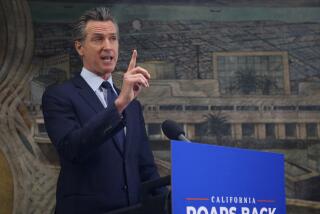Touting a tax on services
This could be a crowd-pleaser: a ballot measure that imposes a sales tax on political ad-making, campaign consulting and lobbying.
But this part could draw loud hoots: taxing haircuts, lawn mowing and baby-sitting.
These levies and many more are contained in a “reform” proposal to extend the state sales tax to most services.
The measure also would lower and flatten the income tax; a family earning $96,000 a year would pay the same rate as one pulling in $960,000.
Who thinks up this stuff? An outfit called The Think Long Committee for California, a creation of globe-trotting billionaire investor Nicolas Berggruen.
Berggruen, 50, says he’s challenged by the gargantuan task of rebooting California’s government to prevent it from finally crashing.
Last year, the so-called homeless billionaire — he doesn’t own a home, just flies from hotel to hotel — recruited a bipartisan panel of prominent Californians to lend their thinking.
They included former Democratic Assembly Speaker Bob Hertzberg, investor and former state Republican Chairman Gerald Parsky, Los Angeles philanthropist Eli Broad, former U.S. Secretary of State George P. Shultz, former California Supreme Court Chief Justice Ronald George, former San Francisco Mayor Willie Brown, former Gov. Gray Davis, Google Chairman Eric Schmidt…
I’ve left off a few, but you get the idea: a very impressive bunch.
They’ve come up with some good ideas and some bad ideas.
Overall, the committee deserves credit for heading in the right direction: Trying to overhaul and update California’s tax system to make it less volatile — less vulnerable to the booms and busts of the national economy — and more responsive to 21st century realities.
Californians have tied the Legislature so tightly in knots — imposing a two-thirds vote requirement for any tax increase — that it’s practically impossible for the lawmakers to modernize the state’s tax code. Even if the net result was a wash — with tax hikes matching tax cuts — it would require a two-thirds vote.
And Republicans are scared silly of anything that smacks of a tax increase.
So Think Long and other groups are trying to fill the Sacramento power vacuum by bypassing the legislative gridlock and going directly to the voters through the signature-collecting initiative process.
Berggruen’s group is the only one that is attempting the politically difficult feat of extending the sales tax to services, as many states did long ago. It would impose a 5% tax on all services except medical care and education.
Meanwhile, it would lower the state sales tax on goods by a half cent to 4.5%. Consumers, of course, also pay local sales taxes so their total levy is much higher: 8.75%, for example, in Los Angeles. Under the proposal, local governments would not have the power to tax services. Only the state would. So if you had your car repaired at an L.A. garage, you’d pay 8.75% on parts and 5% on labor.
Taxable goods are a gradually declining source of state revenue. In 1950, according to the Think Long committee, the sales tax amounted to nearly 60% of all state revenue. The income tax accounted for roughly 10%. Today, it’s the opposite: The sales tax brings in 25%; the income tax more than 50%.
“California’s $2-trillion economy is no longer dominated by manufacturing and agriculture, but is primarily composed of services and information activities,” the committee report notes. “Yet, California’s tax code is so outdated that nearly $1 trillion — that is, roughly half — of the state’s economic output is not taxed.”
So it should be a no-brainer to charge a sales tax on auto repair labor as well as replacement parts.
It’s also a good idea — although it’s likely to be stiffly resisted — to apply the sales tax to legal services and political consulting.
But gardening services and baby-sitting? Doesn’t that just drive the underground economy further underground?
How does that get enforced? The committee is counting on voluntary compliance, I’m told. Good luck. Bad idea.
It’s a good idea to flatten the state income tax and make it less dependent on rich people’s capital gains. The roller-coaster volatility plays havoc with budgeting, resulting in an unreliable funding stream. The latest figures, for 2009, show that the top 1% earned 18% of the income but paid 37% of the total tax.
But the Think Long committee may be flattening the tax too much. There would be only two basic rates: 2% for families earning between $45,000 and $95,000, and 7.5% for those making more than that. The current top rate is 9.3%. As now, there also would be a 1% surcharge on incomes over $1 million.
People earning under $45,000 would pay no income tax and, in fact, receive sales tax rebates.
In all, Californians would wind up with a $10-billion tax hike. Half of it would go to K-12 schools, one-quarter for universities and the rest for local governments. None of it would go into the hands of Sacramento politicians.
Mike Genest, a fiscally conservative finance director for former Gov. Arnold Schwarzenegger, was a major advisor to the Think Long project. “I wish there was a way around a tax increase, but I don’t see it,” he told me. “At some point it’s inevitable. We’re trying to do it in the best way possible to benefit the state.”
Berggruen has pledged to spend $20 million of his own money selling this to voters. But some things just can’t be peddled: like a tax on baby-sitting.
More to Read
Sign up for Essential California
The most important California stories and recommendations in your inbox every morning.
You may occasionally receive promotional content from the Los Angeles Times.











